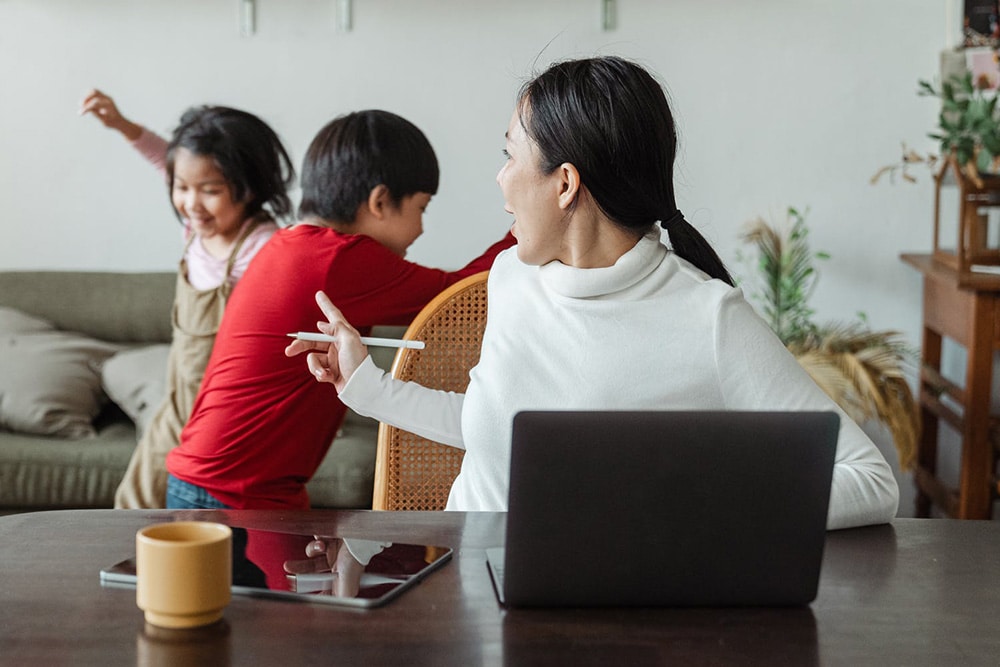
It often feels like healthy communication is one of the first things to go when you’re feeling stressed. As a parent, there is so much on your plate. Work, schooling, activities, household tasks, meals, errands, and more pile on top of each other day after day. As they all vie for your attention, you can end up feeling frazzled. It’s hard to stay focused and productive.
Interruptions and arguments with your children only add to the stress. They clamor for your attention. They resist their homework or chores. Disagreements may seem unavoidable. Like many parents, you likely end up losing your cool. This, of course, only stresses your family more… and the cycle continues.
Do you wish you could give them—and yourself—a calm, peaceful home? Fortunately, all is not lost. There is still lots you can do to reduce anxiety and restore harmony. Changing the way you communicate can help make your home life happier. Here are some ideas.
Tune into Yourself
Before you can create healthier communication patterns with your kids, you need to check in with yourself. After all, if you’re not calm, no one else will relax! To do this, learn to pay attention to what your body is telling you. When you’re rushing to take care of life’s endless responsibilities, it’s easy to lose touch with signs of stress.
With practice, you can capably recognize tension before it becomes chronic.
An easy way to do this is to sit still for five whole minutes. Hide in the bathroom if you need to. Close your eyes and breathe deeply.
Do a body scan. Ask yourself what areas feel tight and tired. Is your jaw clenched or your brows furrowed? Notice and release the muscles. Enjoy the silence. Remind yourself of how remarkable your kids are.
Tune Out Distractions
A simple way to instill more peaceful and communicate better with your kids is to turn off devices. If your interactions with each other are constantly interrupted by the noise and distractions of digital devices, phones, and televisions, it’s time to set limits. Your kids may grumble, but you can use screen time as a reward for good behavior.
Model Healthy Communication
Whether or not you’re aware of it, your kids are absorbing your behavioral patterns merely through passive observation. This adds even more importance to managing your own stress. You’re setting an example for them that will stay with them for life.
Your children truly do want your attention. If they don’t get it positively, they will try to get it through what seems like misbehavior. This can include whining, complaining, picking fights, and more. When you set aside time for intentional connection, sharing, and active engagement, you’re sowing seeds of calm.
Tips for Healthy Communication
- Make eye contact. Let them know you’re listening. Get on their level. Intentionally touch their shoulder or pat their back.
- Ask questions that show you really want to understand what they’re sharing. Make statements that indicate your interest in them and their lives.
- Give them positive feedback. Notice when they’re doing something well. Encourage them if they’re struggling.
- When they ask you questions, take the time to answer them. Don’t dismiss them or put them off.
- Talk to them about your day and what’s going on. Talking often about small things can create a relationship that helps them share when it’s time to talk about bigger things.
- Set aside regular time with your kids to connect. Maybe it’s Friday family nights or Sunday afternoon craft time. Don’t let anything get in the way.
Reap the Benefits
When your kids feel you’re really interested in them and know that you love and respect them, you’re setting the tone for greater calm in the home. They’ll develop more willingness to help and listen to you. When they get positive attention, they will be better able to channel their energy toward productive outlets when you’re busy. Best of all, it will strengthen your relationships for the years ahead.
——
If you feel that the chaos taking over your family life requires more specific or ongoing attention, family therapy can be very helpful. When you’re ready, please reach out to learn more.
